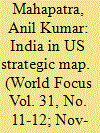| Srl | Item |
| 1 |
ID:
100418


|
|
|
| 2 |
ID:
113743


|
|
|
|
|
| Publication |
2012.
|
| Summary/Abstract |
Expectations that the presidential transition from George W. Bush to Barack Obama would produce a multilateralist turn in American foreign policy have thus far proven misplaced. This is largely because the strategic environment of the post-Cold War era places structural constraints on the ability of any US president, of whatever ideological leanings, to pursue a consistently multilateralist foreign policy. Internationally, the absence of a shared great power threat has undermined the institutional bargain between the United States and allied states, thus rendering the terms of multilateral cooperation more difficult to agree upon. At home, the end of the Cold War has undermined presidential authority and empowered veto players whose interests are threatened by multilateral commitments. Nevertheless, structure is not destiny. Understanding the sources of political constraint can suggest strategies for overcoming or bypassing such obstacles to multilateral engagement in US foreign policy. A president who wishes to exercise multilateral leadership abroad must seek to renegotiate the terms of US engagement with international institutions while fashioning a compelling rationale that mobilizes public support at home.
|
|
|
|
|
|
|
|
|
|
|
|
|
|
|
|
| 3 |
ID:
087944


|
|
|
|
|
| Publication |
2009.
|
| Summary/Abstract |
IN THE early months of the Obama presidency, the national-security debate has focused heavily on two areas: personality and process. To many, the third vital component-policy-had largely been addressed and in broad terms resolved during the presidential campaign-Iraq, Afghanistan, Iran. Yet thus far, the personality discussion has been simultaneously overblown and misdirected, the process discussion has been largely technical and misguided, and the policy discussion has failed to address the most important concerns confronting the United States. In short, after the worst eight years in modern U.S. foreign-policy history, we may be setting the stage for potentially even-bigger mistakes to come.
|
|
|
|
|
|
|
|
|
|
|
|
|
|
|
|